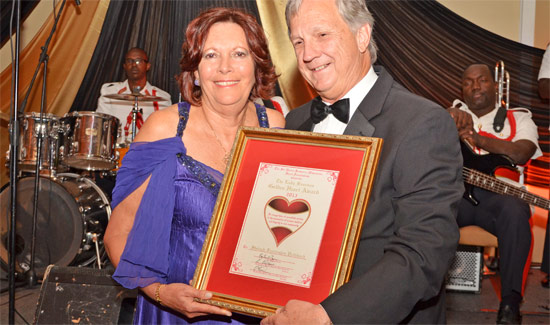
On the Caribbean island of Barbados, with a population of about 250,000 people, approximately 3,426 persons are living with HIV, and Minister of Health Stephen Lashley has warned, “That is not likely the exact figure.”
The HIV/AIDS pandemic is particularly worrying for small countries because most of the infected people are in what the minister described as “their productive years, between the ages of 15 and 49”. Obviously, the economic consequences for small countries of losing their most productive people are very grave.
Barbados is not unique. Many other Caribbean countries are in a similar situation and some of them are worse.
While on a per capita basis, the problem of persons infected with HIV/AIDS is serious in the Caribbean, it is even more so in Africa.
Increasingly, the issue is becoming not only one of health but also of human rights. This is because, in part, HIV/AIDS is linked to homosexuality, even though homosexuality is not the sole contributor to the contraction and spread of HIV/AIDS.
In many countries where homosexuality is criminalized, as is buggery, it is claimed that homosexuals requiring treatment for the disease fear seeking such treatment lest they expose themselves to imprisonment for criminal activity.
Recently, UN Secretary-General Ban Ki-moon told African leaders at an African Union Summit that they should respect the rights of homosexuals, and stop treating gays as second-class citizens or even criminals. In many African countries, homosexuality is illegal, and there have been many reports of discrimination and violence against homosexuals. The response to Ban Ki-moon from some African governments has been dismissive, if not angry.
Late last year, representatives of Caribbean and African governments had also reacted heatedly to the repetition by British Prime Minister David Cameron of a policy position put out last July that the UK government would review “budgetary support” to governments that discriminated against vulnerable groups such as young girls, women and homosexuals. The hostile response came even from governments that do not receive “budgetary aid” and would not be affected by the British position.
Canada’s Foreign Affairs Minister John Baird also stepped into the debate in January. Addressing the Royal Commonwealth Society in London, Baird urged Commonwealth countries to protect the rights of homosexuals. He singled out African and Caribbean countries in particular.
Stressing the human rights aspect of the issue, Baird said: “The criminalization of homosexuality is incompatible with the fundamental Commonwealth value of human rights.” And, he declared that the Canadian government “will continue to press countries in the Commonwealth to live up to their international obligations, and uphold the basic contract any government should have with its people”.
The stance of the Canadian government is entirely consistent with the position adopted by 11 persons from the Commonwealth (of whom I was one) who were convened as an Eminent Persons Group (EPG) to provide heads of government with recommendations on reform of the 54-nation Commonwealth to make it relevant to its times and its people.
The report pointed out that of the 33.3 million people in the world now living with the HIV virus, over 60 percent of them live in Commonwealth countries, making it a very specific Commonwealth problem.
We made the point that there is currently no cure for HIV/AIDS. There is no reliable and effective vaccine. It is a disease that cannot be contained by ordinary strategies, such as quarantine. Every year, approximately 2.6 million people are newly infected with HIV. Therefore, methods of prevention and access to treatment for all have to be implemented. Amongst those methods should be the repeal of laws that hamper the effective response to the epidemic.
The alternative is that the population of many Commonwealth countries will continue to be ravaged, with dire consequences for economic development and human life especially for countries with already small populations.
The EPG also pointed out that there are “criminal laws in many Commonwealth countries that penalize adult consensual private sexual conduct including between people of the same sex. These laws are a particular historical feature of British colonial rule. They have remained unchanged in many developing countries of the Commonwealth despite evidence that other Commonwealth countries have been successful in reducing cases of HIV infection by including repeal of such laws in their measures to combat the disease”.
The report argued that the “repeal of such laws facilitates the outreach to individuals and groups at heightened risk of infection” and it stated that “the Commonwealth Secretariat should engage with private sector organizations, including the pharmaceutical industry and philanthropic organizations inside and outside the Commonwealth, to establish joint programs that could have an impact in preventing and treating HIV/AIDS in the Commonwealth and showing the way for the world to do so”.
As it turned out, two of the more important recommendations on the issue of HIV/AIDS including one that urged governments to take “steps to encourage the repeal of discriminatory laws that impede the effective response of Commonwealth countries to the HIV/AIDS epidemic, and commit to programs of education that would help a process of repeal of such laws” were referred to a task force of ministers who will meet during this year to decide if the recommendations will be adopted and how best they could be implemented.
Both Canada’s John Baird and Barbados’ Foreign Minister Maxine McClean are members of the task force. Their task will not be easy, and at the back of McClean’s mind will be the opposition to gays and lesbians by the influential religious-fundamentalist groups in Caribbean countries.
Nonetheless, the choices now are stark: Do Commonwealth governments do everything possible to stem the destruction of people in their most productive years and so enhance their nations’ growth and development, or do they give silent support to a prejudiced view, long since discarded by most of the world, that deprives a section of their societies of their human rights and protections?
By Sir Ronald Sanders
Sir Ronald Sanders is a business executive and former Caribbean diplomat who publishes widely on small states in the global community.



